IOS organises Lecture on "Justice in Crisis"
January 10, 2015 at IOS Conference Hall
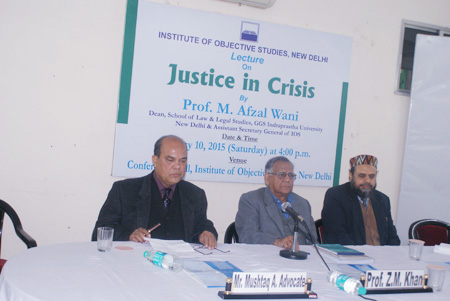
New Delhi, Jan. 10: A lecture on "Justice in Crisis" was organised by the Institute of Objective Studies (IOS) here today. Dean, School of Law and Legal Studies, GGS Indraprastha University, New Delhi, Prof. M. Afzal Wani, who delivered the lecture, held that when a judge, supposed to be a conscience keeper of society, failed in his endeavour to maintain the confidence of the people in the system, it culminated into spoiling of the whole polity, leaving everyone in disarray, dismay, hopelessness, chaos, mistrust, misery and misfortune, which ultimately produced corruption.
Its worst fallout was an untamed executive and a wayward legislature, without required degree of initiative and without any fear of constitutionally mandated judicial review, he said. The best way to support injustice had been established as the practice of causing delay in adjudication and uncertain results on the disposal of cases. Pendency of cases, being counted in crores, he said, was at the root of evils like suicides. This was the reason why most of the social, cultural, political and economic problems were not pondered over, he argued.
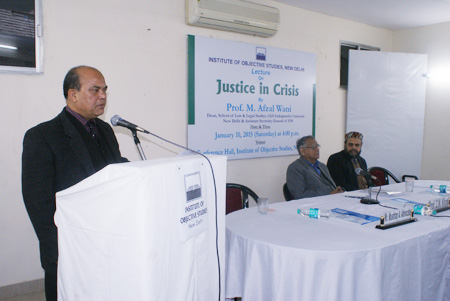
Dr. Wani noted that a debate on judicial reforms had now been going on for long. The malaise of adjournments and corruption and issues of training of judges, increase in the number of judges, mode of appointment of judges, improving the quality of the bar, encouraging mediation, training of police personnel and promotion of paralegals. He said that the number of judges, compared to any developed country, should be compared with the number of dockets a judge had to deal with rather the ratio of judges to the credulous Indian population fearing to tread in a court like treading in a jungle with no idea of a track to follow.
Delay in filling of vacancies of judges on the ground of non-availability of deserving persons could not be accepted as the politics in appointments could be one of the causes. To restrict its rigour, at least an examination on the lines of the "advocate-on-record examination" or so, must be conducted on an all-India basis for stopping the problem from snowballing into a crisis, he suggested. He contended that the training for them should be arranged with inputs of highly sensitising content of Indian literature from authors with social and patriotic orientation along with legal literature. The enormity of the non-efficiency of the judiciary and solutions to the problems thereby demanded an objective assessment of the impact of delay in justice in terms of damage to economy, society and the polity, he observed.
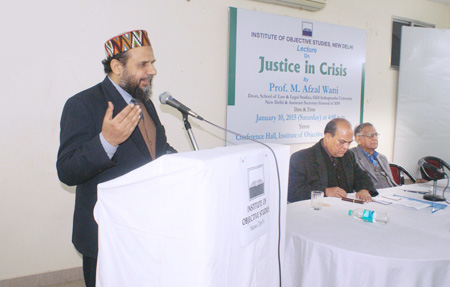
He held that the increasing number of under-trials in jails living on hard-earned money of tax payers, was a big loss to the nation. He said that the responsible behaviour of the police personnel with the development of the concept of social bail by involving respectable members of society as an option to putting every accused behind the bars offered a solution to the problem, besides efforts in regard to improving the trial and investigation mechanisms.
Compulsory pre-litigation mediation and other alternative methods of dispute resolution could help in reducing the rate of filing in civil cases and plea bargain could largely help reduce pendency in criminal cases. These kinds of proceedings definitely needed a skilled monitoring of basic standards by justice and avoiding coercion to a weaker party, he added.
Prof. Wani remarked that a confounding situation to benefit in a multiple way from a violation of rules, sustained due to delay in justice. Faith of the people in the system could not be maintained in the absence of timely access to and the availability of justice, he maintained.
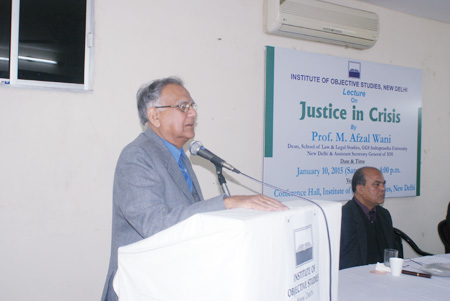
He held that there was no answer to the folly when a judge refused to adjudicate on a matter for the only reason that the party with dirty hands was known to him and the other one with clean hands was a socially deprived person. He pleaded that the demand for judging the judges, coming at a very high pitch, should certainly be given an appropriate thought to understand the real reasons and effective remedies. Hailing the judiciary for contributing to development through many popular judgments, he said that it could not be under over-reach or activism. He urged the civil society to come forward on the side of weaker parties in court and join the process of justice.
Prof. Wani noted that social repercussions in the form of increasing criminal behaviour, insecurity, hooliganism disrespect for government institutions, mushrooming of mafia -political, trade and extortionist, were found around calling for only a strong justice delivery system. Consumers and business promoters were equally in need of that. Split homes were waiting for a verdict for years; a fired worker was in peril with no idea about the time needed for the conclusion of his trial; an under-trial was languishing in jail to remain a burden/parasite for the family and the society, and many were also looking for better enforcement of arbitration awards, but the answer was not coming as that had to come from working together for timely justice, he concluded.
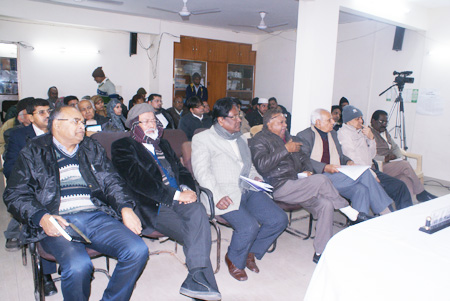
The Chairman of the IOS, Dr. M. Manzoor Alam, in his remarks informed that the present lecture was part of a series of lectures planned to be organised over a period of time on various issues of social, economic and political importance. He said a similar lecture concerning Indian judiciary would be organised at the Indian Law Institute very shortly.
Earlier, Hafiz Athar Husain recited a verse from the Quran marking the beginning of the function. Advocate-on-Record, Supreme Court of India, Mr. Mushtaq Ahmad, who introduced the subject and conducted the proceedings, held that all the issues could be addressed if the lawyers, judges and other agencies of law heeded the advice of the Quran. He remarked that the Quran had given the message of justice for all.
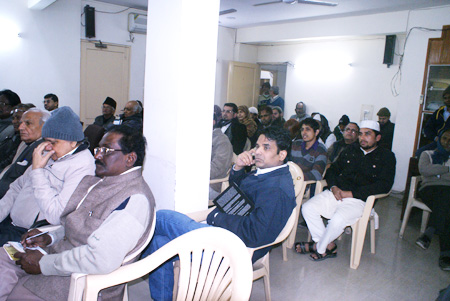
Besides the Vice-Chairman of the IOS, Prof. Refaqat Ali Khan, its Secretary General, Prof. Z M Khan, and Associate Professor of Law, JMI, Dr. Eqbal Husain, those who attended the lecture included President of TMF, Mirza Zaki Beg, President, The Origin, Dr. Sharique Nadeem, Mr. Prabhash Kumar Yadav, advocate, Mr. Athar Alam, advocate, Associate Editor, Mr. Abdul Bari Masood, Mr. Naveen Kumar, Mr. Harsh Gautam, Senior journalist Mr. Zeyaul Haque, Research students, Mushtaq Ahmad Wani, Gowhar Quadir Wani, Saleem Ahmed and several social activists and prominent citizens.
|